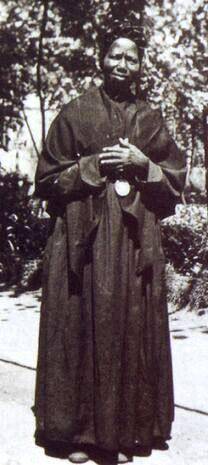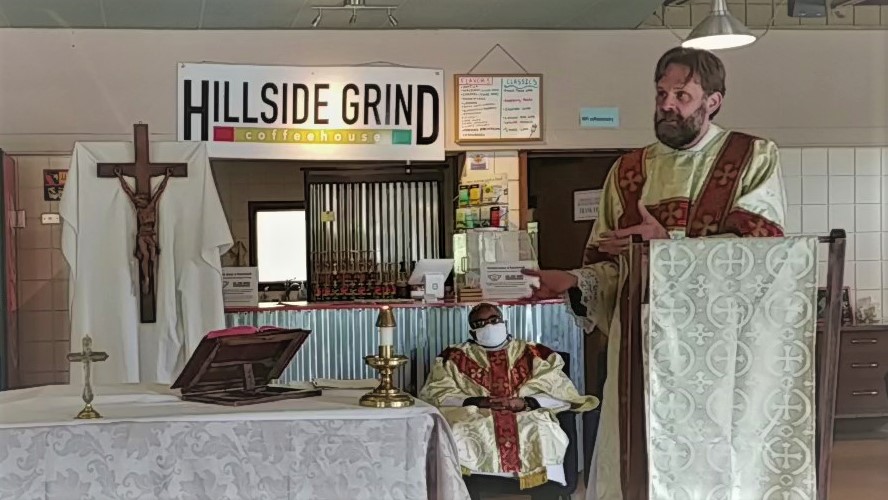You Are Loved. Life is Good.
Last Homily of the Semester
Following is the homily preached by Deacon Matt Newsome, campus minister, during the last Mass of the Spring semester, on the 6th Sunday of Easter, May 9, 2021.
Beloved, let us love one another, because love is of God; everyone who loves is begotten by God and knows God. Whoever is without love does not know God, for God is love.
1 Jn 4:7-8
We’ve come to the end of what has been a very different year for all of us. There is a lot that we normally associate with the college experience that sadly you have not been able to participate in this year. But I hope you have been able to engage in what is the real reason for all of you being here, which is to learn.
That’s why you’re all in college — or why you should be here. You want to learn. Whether you are studying the natural sciences or the liberal arts, you are here in pursuit of truth; to come to a greater understanding of yourself and the world around you. This is what college is all about. It’s not just about getting a job after graduation. It’s not about getting an A on your exams or having a certain GPA. It’s about the pursuit of truth.
And that’s a very Catholic thing. The Catholic Church, after all, established the very first university systems in Europe for the purpose of pursuing truth. They called these schools universities because they sought universal knowledge by studying not only what we would call the natural sciences but also mathematics, theology, and philosophy. The human mind is made to know the truth, both about God and ourselves, about the world God made and our place in it. Pursuing that truth is a very human, and a very Catholic thing to do.
So I think it is providential that here at the end of our academic year the scripture readings for this Sunday reveal the fundamental truth of all reality; the truth that lies at the heart of everything. You may fail all of your classes, but if you learn this one thing, you will have learned enough. What is this fundamental truth? It is this: God is love (1 Jn 4:8).
It sounds like a sentimental statement, doesn’t it? Like something you’d put on a sticker or a tshirt. It’s easy to read this verse and think, “how nice,” and then move on. We might think this is just a poetic way of saying that God is loving or God is lovable. He is those things. But that’s not what this verse says. It says God is love. And if you take the time to think about that assertion, it’s striking how odd it is.
How can God be love? Love is something you do, not something you are. It’s an action word. It’s a verb. Love is dynamic. How can you be love? Well, to answer that, we have to know what love is, don’t we? And I don’t mean a crush, or even affection. I mean love.
The classic definition of love is to will the good of another. But we shouldn’t confuse this with a wish or a passive desire. I can wish you well and that’s not really love. When you actively work for the good of someone else, that’s love. Love doesn’t mean having good feelings about someone. Love is a choice. It’s something you do. That means it’s something you can do well or do poorly. And if God is love, obviously he would be the perfect love. What would that look like?
Jesus tells us that the greatest love is this: to lay down your life for your friends (Jn 15:13). Think about it: if love means willing the good of the other, it follows that the most radical way of doing that would be to give your whole self to another person, even to the point of giving your life. And it would have to be a free gift, because love cannot be forced. Love must be chosen. And for that love to be truly perfect it would be reciprocal; the person whom you give yourself freely to would also give themselves freely to you. And what’s revealed to us in the scriptures today is that God is that. God is the free and complete reciprocal self gift between persons. That’s the nature of the Divine.
But how can someone be all of that? It seems too much for one being. The free and complete reciprocal self-gift between persons would require a Lover, a Beloved, and the Love they share. And that’s exactly what God is: the Father, the Son, and the Holy Spirit — the Blessed Trinity. When John says God is love, that’s a Trinitarian statement. God is the Lover, the Beloved and the Love, each Person giving themselves so completely to the others that they share the same being — and they do this for eternity. That’s God. God is love.
And since God is the primordial being, the First Cause of all that is, what this means is that the fundamental nature of reality is love. It means that the force that brought the universe into being is love. It means that the image in which you and I are made is love. It means that the purpose of our lives is to love and to be loved. Love is the reason we all exist.
Now with that in mind, listen to the invitation Jesus gives us in the gospel: As the Father loves me, so I love you. Remain in my love (Jn 15:9).Jesus says no one has greater love than to lay down his life for his friends, and then he calls us his friends. I no longer call you slaves, but I call you friends (Jn 15:15).

Let me tell you a story about one slave whom Christ called his friend. St. Josephine Bakhita was born in Sudan around 1869. When she was just a little girl, she was kidnapped by Turkish slave traders and sold and resold repeatedly to different masters who treated her cruelly, inflicting unbelievable pain and torture upon her. One of her masters was a military general who would flog her every day until she bled. One of her mistresses would carve designs into her flesh and pour salt into the wounds so they would scar. She considered this “art.” She was abused to the point where she forgot her name. Can you imagine being in so much pain that you lose your sense of identity and forget who you are? It was one of her masters that ironically gave her the name Bakhita, which means “lucky.”
Eventually Bakhita was sold to the Italian consul in Sudan who took her with him back to Italy where she was treated with kindness. She worked for a family as a babysitter and would accompany the child in her care during her catechetical instruction, where she began to feel drawn to the Catholic Church. In 1890, when she was 21 years old, she was baptized and confirmed, taking the Christian name Josephine. She remained in Italy for the rest of her life, eventually joining a convent of religious sisters in Verona.
The sight of a scarred black woman in a nun’s habit walking the streets of Verona was a curiosity to say the least. But what attracted people to her was her simplicity of life, her holiness, and her hope. She became a beloved member of the community. The local citizens would refer to her as “our black mother,” and when she died in 1947 people came to venerate her scarred body, touching their rosaries to her, because they knew then that Sister Josephine was a saint.
How did this woman who had been abused until she lost herself find her identity? Where did she find hope? How could she possibly be happy given everything she had been through? It’s because in Jesus Christ she recognized a master different from any master she had served in this life, a master who instead of flogging her would be flogged for her. A master who would give his life for her. A master who called her friend.
St. Josephine Bakhita described her faith in this way: “I am definitively loved and whatever happens to me — I am awaited by this Love. And so my life is good.”
My brothers and sisters, you have been chosen by God. You have been chosen by the great Love that underlies all of creation. The Love that brought the universe into being calls you his friends. You are definitively loved, and whatever happens to you, you are awaited by this Love. Remain in this love. Share this love with one another. And your life — whatever happens — will be good.

